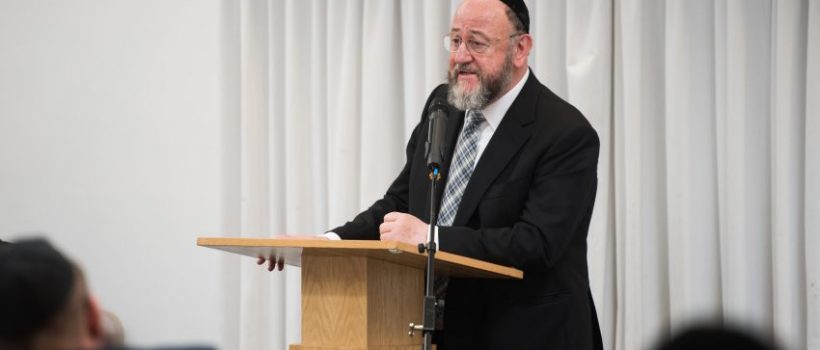The Chief Rabbi’s Pesach Message 5778

We have a fascinating family custom: at the Pesach Seder our family sings the words of the passage known as ‘Chasal Siddur Pesach’ to the tune of Chanukah’s Maoz Tzur.
This has prompted me to consider what the festivals of Pesach and Chanukah have in common. Of course, both celebrate the miraculous intervention of the Almighty to save our people and both are eight days long in the Diaspora. Interestingly, if necessary, Jewish law requires one to sell one’s clothing or receive tzedakah in order to purchase candles for the Chanukiah. This is strikingly similar to Pesach, when one is required to sell one’s clothing or receive tzedakah in order to buy wine for the required four cups. There was also a fascinating and beautiful custom among the Jews of Izmir in Turkey to use their leftover oil from the previous Chanukah to light a small oil lamp, which they used for Bedikat Chametz, the search for chametz, on the night before Pesach.
Yet, the most substantive, thematic connection between Chanukah and Pesach is the centrality of education as a Jewish value. Both festivals lead us to appreciate the crucial importance of learning in our tradition; a lesson encapsulated by our Sages, who declared, Vetalmud Torah Keneged Kulam – the study of Torah supersedes all (Mishnah Pe’ah 1).
The Hebrew word Chanukah (dedication) comes from the same root as chinuch (education). Indeed, dedication to education is a key feature of the Chanukah narrative. The survival of our spiritual legacy, despite the intentions of the Hellenists, was rooted in our commitment to teaching Torah and its values.
The primary purpose of the Pesach seder is education – “And you shall relate to your child on that day saying, “It is because of this that the Almighty performed these miracles for me when I left Egypt” (Shemot 13:8). But, more than that, the Pesach seder itself sets out the ideal framework for the most impactful education – an audio-visual, experiential encounter which utilises storytelling, questioning and a veritable assault on our senses to ensure that the experience is an unforgettable treat. It is no accident that of all our traditions, the seder night remains the most widely observed, even in families who would otherwise consider themselves entirely secular. Research has shown that more Jews attend a Pesach seder every year than those who fast on Yom Kippur. Pesach teaches us what the best teachers already know – that the most effective education must be experiential.
This lesson is of particular relevance to us today. British Jewry is blessed to have truly outstanding schools which, year on year, are heralded as being amongst the finest in the country. I am always personally moved by the dedication shown by trustees, governors and staff at our wonderful schools and they would be the first to say that there is nothing more impactful or foundational to a Jewish child’s identity, than a powerful Jewish experience.
Whatever the setting; formal or informal, at school or at home, may this Pesach present an opportunity for us to refocus on a truism of Jewish life – the greatest key to a successful Jewish future is quality Jewish education.
Valerie and I wish you a chag kasher ve sameach.
Chief Rabbi Ephraim Mirvis
March 2018 • Nisan 5778
To listen to the Chief Rabbi reflect on the messages of Passover on Thought for the Day, click here.


